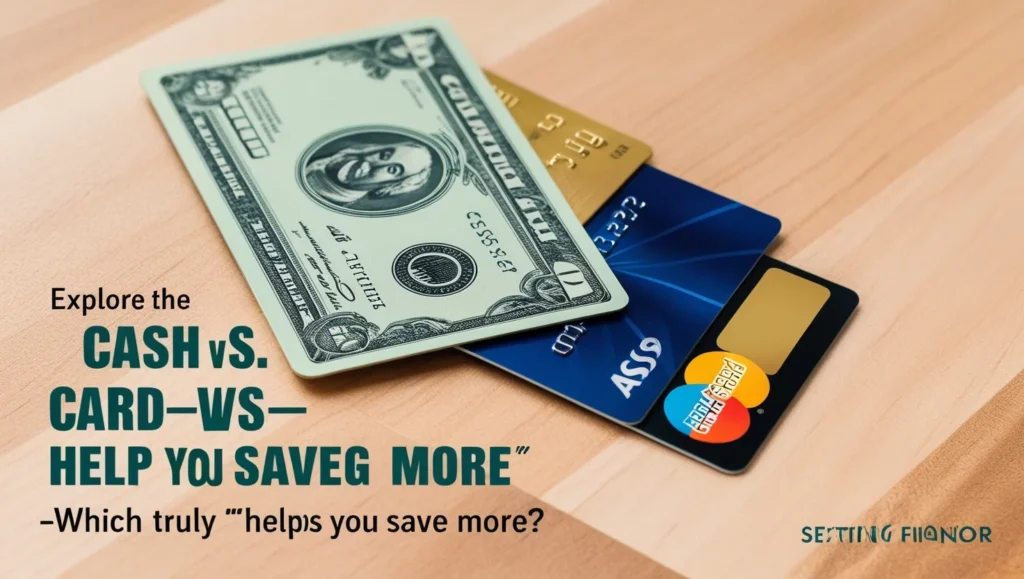Cash vs Card Which Helps You Save More
Cash vs Card Which Helps You Save More, one of the most common debates is whether to use cash or cards for daily expenses. Each method has its own merits, drawbacks, and impact on saving money. Choosing the right payment method depends on your spending habits, financial goals, and the psychological effects of each. Let’s dive into the advantages and disadvantages of both cash and card payments and explore how each can influence your savings. Cash vs Card Which Helps You Save More
The Case for Cash: Tangible Spending
Advantages of Using Cash
- Increased Awareness of Spending
When you physically hand over money for purchases, you feel the impact of the transaction. This tangible act often leads to more mindful spending. - Limits Impulse Purchases
Carrying a fixed amount of cash means you can only spend what you have. This self-imposed cap naturally curbs overspending and discourages unplanned purchases. - No Hidden Costs
Cash transactions don’t come with fees or interest, unlike credit card payments, which might incur additional costs if balances aren’t paid in full. - Helps with Budgeting
Using the envelope system—allocating specific amounts of cash to various categories—can help you stick to a budget and track expenses more effectively. Cash vs Card Which Helps You Save More
Disadvantages of Using Cash
- Inconvenience
Carrying large amounts of cash can be cumbersome and risky. In emergencies, cash might not always be accessible. - Lack of Rewards or Benefits
Unlike credit or debit cards, cash payments don’t come with perks such as cashback, reward points, or travel miles. - No Record of Transactions
With cash, it’s harder to track spending unless you diligently record every transaction.
The Case for Cards: Convenient and Rewarding
Advantages of Using Cards
- Convenience
Cards are lightweight, secure, and universally accepted. They’re ideal for online shopping, large purchases, and emergencies. - Expense Tracking
Credit and debit cards automatically generate statements, making it easier to monitor spending patterns and identify areas to cut back. - Rewards and Perks
Many credit cards offer cashback, discounts, reward points, and benefits like travel insurance or extended warranties on purchases. - Building Credit History
Responsible credit card usage helps build a good credit score, which is essential for obtaining loans or mortgages in the future. - Protection Against Fraud
Cards often come with fraud protection and the ability to dispute charges, offering a layer of security that cash cannot.
Disadvantages of Using Cards
- Encourages Overspending
The ease of swiping a card can make it harder to stick to a budget, leading to unnecessary purchases. - High-Interest Rates
If you carry a balance on your credit card, the interest charges can quickly accumulate, eroding your savings. - Fees and Charges
Some cards come with annual fees, foreign transaction fees, or penalties for late payments, which can add up over time. - Risk of Debt
Over-reliance on credit cards can lead to debt accumulation if spending isn’t controlled.
The Psychology of Spending: Cash vs. Card
Cash vs Card Which Helps You Save More studies suggest that people tend to spend more when using cards compared to cash. The pain of paying, a psychological concept, is greater with cash because you physically see the money leaving your hands. Cards, on the other hand, create a sense of detachment from the actual expenditure, making it easier to justify larger or more frequent purchases. Cash vs Card Which Helps You Save More
When to Use Cash
- For small, everyday expenses like coffee, groceries, or local markets.
- If you’re trying to stick to a strict budget.
- When you want to limit discretionary spending.
- In places where cards aren’t accepted or incur additional charges.
When to Use Cards
- For large purchases where rewards or cashback apply.
- When you need to track expenses for tax purposes or budgeting tools.
- For online shopping or bookings that require upfront payment.
- In emergencies or while traveling, for added security and convenience.
The Hybrid Approach: Balancing Cash and Card
For most people, a combination of cash and card usage offers the best of both worlds. Here’s how you can leverage both to maximize savings:
- Set a Cash Budget for Daily Expenses
Allocate a fixed amount of cash for weekly or daily expenses to control impulsive buying. - Use Cards Strategically
Reserve credit card usage for planned, larger purchases to earn rewards or cashback. Ensure you pay off the balance each month to avoid interest charges. - Automate Savings with Debit Cards
Some debit cards allow you to round up purchases and transfer the difference to a savings account. - Emergency Reserve
Keep a small amount of cash for emergencies but rely on cards for larger or unexpected expenses.
Final Verdict: Which Saves More?
The answer depends on your spending habits and financial discipline:
- Cash helps you spend within your means and develop mindful spending habits, making it ideal for those who tend to overspend.
- Cards are best for disciplined users who can pay off balances monthly and take advantage of rewards programs.
Final Thoughts
By understanding the strengths and weaknesses of both methods, you can develop a financial strategy that works for you. Whether you prefer cash for its simplicity or cards for their convenience and perks, the ultimate goal is to save more and spend wisely. Cash vs Card Which Helps You Save More
Start evaluating your payment habits today and strike the right balance to achieve financial success!

